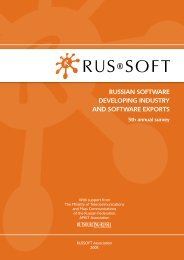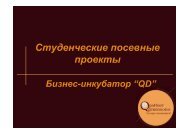russian software developing industry and software exports
russian software developing industry and software exports
russian software developing industry and software exports
You also want an ePaper? Increase the reach of your titles
YUMPU automatically turns print PDFs into web optimized ePapers that Google loves.
Chapter 3.<br />
Major Trends in the Russian Software Development Industry<br />
Consequently, the number of records for consolidation<br />
has significantly dropped among all companies. For<br />
major companies with the turnover from 4 MSUD to<br />
20 MUSD this indicator is higher than average (54%<br />
<strong>and</strong> 71%, respectively) <strong>and</strong> maintained at the level of<br />
last year. To compare: only 5% of companies with the<br />
turnover less than 0.5 MUSD referred to consolidation<br />
as the key trend characteristic of the <strong>industry</strong>.<br />
It should be marked, that apart from “Growth in the<br />
Field of IT Outsourcing” most important trends also<br />
include “Increase in Direct Sales through the Internet”,<br />
whereas a year ago it was placed in the lower part<br />
of the rating. Now «Quality Management Systems<br />
Implementation» moved to the rating’s bottom.<br />
«Custom Software Development» also dropped but<br />
only due to answers from representatives of small<br />
companies. Around a half of major companies named<br />
this trend (54% of companies with the turnover from<br />
4 MUSD to 20 MUSD <strong>and</strong> 43% with the turnover<br />
over 20 MUSD).<br />
Priority areas of development were determined<br />
by the companies according to the current trends (as<br />
seen by respondents).<br />
Based on the results of the poll it can be concluded<br />
that none of the companies with the turnover<br />
more than 20 MUSD indicated among its key goals<br />
«Certification of Software Development Processes»<br />
(such companies already have all required certificates)<br />
, «Increase in Direct Sales through the Internet» <strong>and</strong><br />
«Establishment of Development Centers in Regions».<br />
These companies are aimed at «More Active<br />
Operations in the Home Market» (86%), «Export<br />
Operations» (71%) <strong>and</strong> «Establishment of a Wide<br />
Marketing Network Abroad» (57%).<br />
It is noteworthy, that despite export-oriented<br />
companies (with 51% <strong>exports</strong> share in total revenue)<br />
think that the prospects for growth of the domestic<br />
market have somewhat improved, they still mainly<br />
focus on the “Export Operations” rather than<br />
“Increase of Sales in the Domestic Market” (66%<br />
against 41%).<br />
Quality Management<br />
Systems Certification<br />
The share of companies granted a compliance<br />
certificate with an international st<strong>and</strong>ard (CMM, CMMI<br />
or ISO) has increased from 26.5% to 35.5% over the<br />
last year. As shown by the results of the poll, this<br />
happened owing to compliance certification with<br />
ISO 9000. The proportion of companies holding<br />
CMM/CMMI certificates has even slightly reduced, but<br />
probably because of the increase in the number of<br />
respondents (mainly small <strong>and</strong> medium).<br />
The majority of large companies are already<br />
certified (78% with the turnover more than 20 MUSD<br />
<strong>and</strong> 65% with the turnover from 4 MUSD to 20 MUSD).<br />
Those without a certificate yet are planning to obtain<br />
it in the coming 2 years (all major companies <strong>and</strong><br />
67% of companies with the turnover from 4 MUSD<br />
to 20 MUSD).<br />
More than 30% of smaller companies also plan<br />
to undertake certification, but in most cases heads<br />
of small enterprises do not think highly of their<br />
capabilities given a high cost <strong>and</strong> complexity of the<br />
certification procedure.<br />
80%<br />
70%<br />
60%<br />
50%<br />
40%<br />
30%<br />
20%<br />
10%<br />
0%<br />
64.5%<br />
Not certified<br />
Companies certified to comply<br />
with international st<strong>and</strong>ards<br />
30.7%<br />
ISO<br />
2.7% 4.4%<br />
CMM<br />
CMMI<br />
* totally more than 100%, because a number of companies has been<br />
certified to comply with several st<strong>and</strong>ards<br />
Local market growth<br />
Increase in direct sales<br />
through the Internet<br />
Establishment of a wide<br />
marketing network<br />
overseas<br />
Certification of <strong>software</strong><br />
development processes<br />
Priority trends of business development<br />
Export growth<br />
Establishment<br />
of development<br />
centers in regions<br />
0% 10% 20% 30% 40% 50% 60% 70% 80%<br />
8%<br />
7%<br />
16%<br />
22%<br />
38%<br />
66%<br />
Obviously, the number of companies certified with<br />
an international st<strong>and</strong>ard is higher among companies<br />
with the share of <strong>exports</strong> over 51%. In this group the<br />
number of those eager to pass certification (in case<br />
any of the certificates is missing) is also bigger. For<br />
these companies, as well as the major market players,<br />
compliance of their quality management system with<br />
international st<strong>and</strong>ards is more important than for<br />
companies operating mainly in the Russian market.<br />
There are grounds to believe that the proportion<br />
of companies certified with CMMI will grow in the<br />
near future. In 2009, the developer of the CMMI<br />
st<strong>and</strong>ard the Carnegie Mellon Software Engineering<br />
Institute (SEI) authorized a consultant <strong>and</strong> partner of<br />
the Russian company Inspirex Consulting as a CMMI<br />
Lead Appraiser. Earlier Russia did not have such a<br />
qualified appraiser. The availability of an authorized<br />
28








